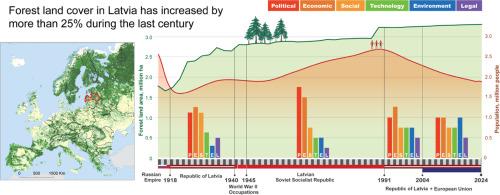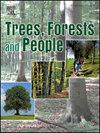拉脱维亚森林用地、管理和政策变化的驱动因素:一个多世纪的转型
IF 2.9
Q1 FORESTRY
引用次数: 0
摘要
本研究考察了政治、经济、社会、技术、环境和法律因素之间复杂的相互作用,这些因素在过去一个世纪里塑造了拉脱维亚的森林土地利用、管理和政策。使用PESTEL分析方法,该研究确定并评估了六个不同历史政治时期(从俄罗斯帝国到拉脱维亚目前的欧盟成员国)这些驱动力的相对重要性。研究结果表明,政治和经济因素一直是主要的影响因素,它们的相对权重随着主流治理体系的变化而变化。该研究强调了占领如何导致不可持续的森林开发,而拉脱维亚的独立和随后加入欧洲联盟促进了更平衡的森林管理方法。该报告的结论是,虽然环境因素,特别是气候变化日益重要,但政治和体制决定在制定森林政策方面仍然至关重要。这一历史观点为预测拉脱维亚以及具有类似历史轨迹的其他国家未来森林变化和制定可持续管理战略提供了宝贵的见解。该研究有助于整合森林研究人员、政策制定者、环境活动家和土地利用专家的观点,以加强对森林治理和可持续性挑战的理解。本文章由计算机程序翻译,如有差异,请以英文原文为准。

Drivers of forest land, management, and policy changes in Latvia: Over a century of transitions
This study examines the complex interplay of political, economic, social, technological, environmental, and legal factors that have shaped forest land use, management, and policy in Latvia over the past century. Using a PESTEL analysis approach, the research identifies and evaluates the relative importance of these driving forces across six distinct historical-political periods, from the Russian Empire to Latvia's current EU membership. The findings reveal that political and economic factors have consistently been the dominant influences, with their relative weights shifting according to the prevailing governance systems. The study highlights how occupations have led to unsustainable forest exploitation, while Latvia’s independence and subsequent integration in the European Union have fostered more balanced approaches to forest management. The paper concludes that while environmental factors, particularly climate change, are increasingly significant, political and institutional decisions remain crucial in shaping forest policy. This historical perspective provides valuable insights for anticipating future forest changes and developing sustainable management strategies in Latvia, as well as potentially in other countries with similar historical trajectories. The study may serve to integrate the perspectives of forest researchers, policymakers, environmental activists, and land-use experts to enhance the understanding of forest governance and sustainability challenges.
求助全文
通过发布文献求助,成功后即可免费获取论文全文。
去求助
来源期刊

Trees, Forests and People
Economics, Econometrics and Finance-Economics, Econometrics and Finance (miscellaneous)
CiteScore
4.30
自引率
7.40%
发文量
172
审稿时长
56 days
 求助内容:
求助内容: 应助结果提醒方式:
应助结果提醒方式:


